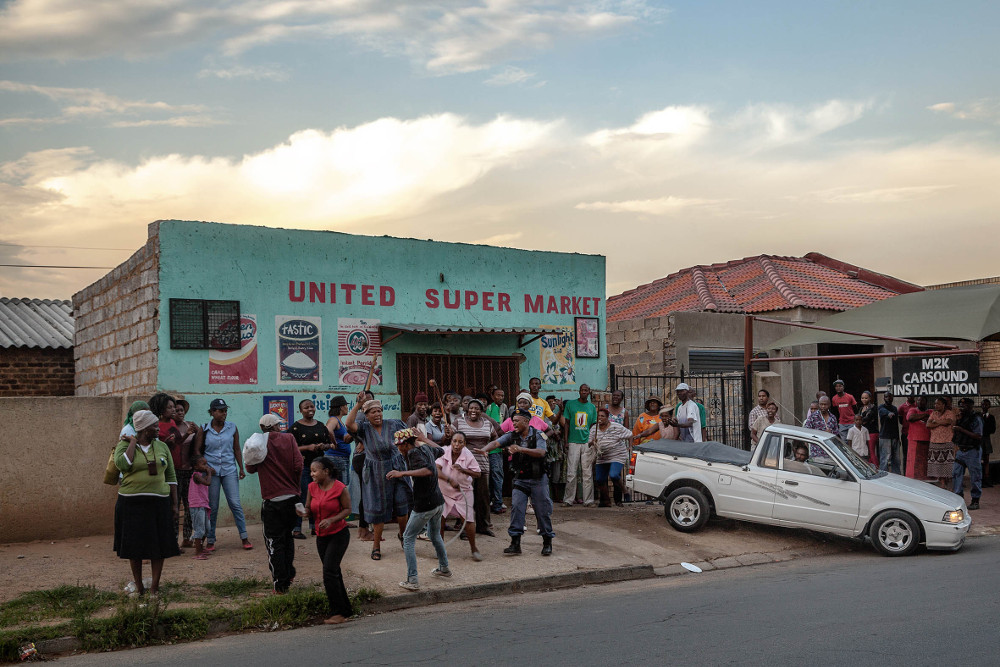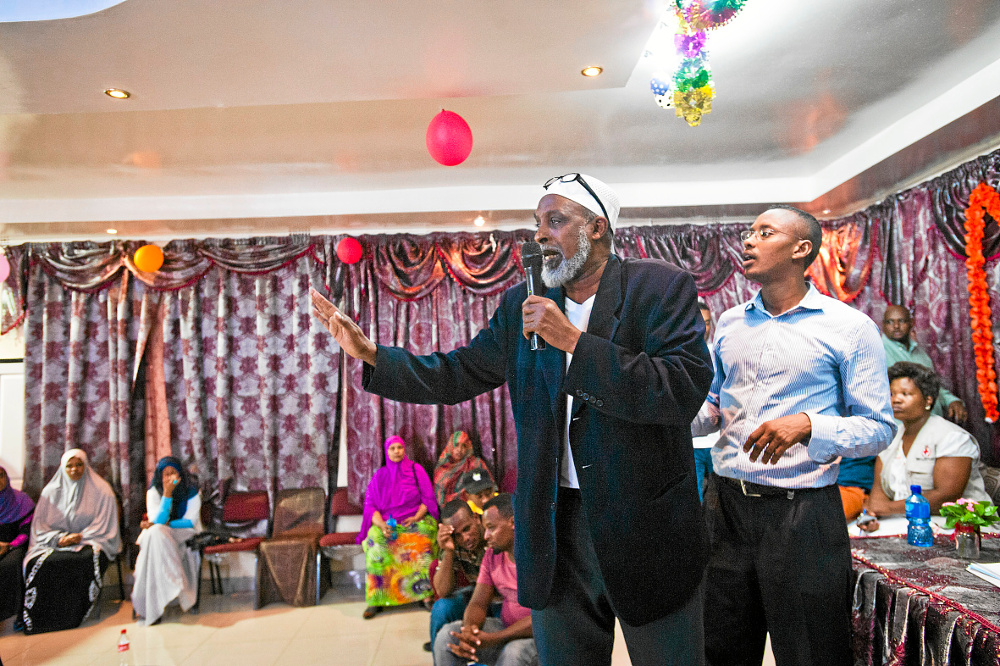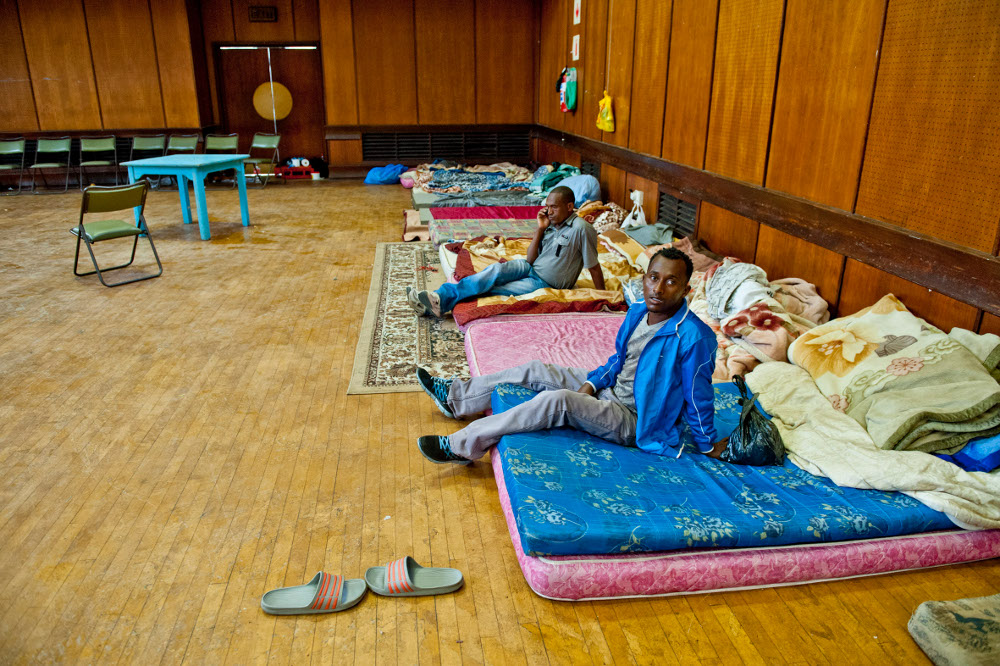When is the widespread looting of foreign-owned township shops not xenophobia? When it is criminal activity that has “nothing to do with foreign nationals”, Gauteng premier David Makhura said in Soweto a week ago, even as foreigners were still fleeing that township.
Various organisations, political parties and experts have now accused the government and the ANC of “xenophobia denialism”, and pointed out that such a see-no-evil approach encourages future incidents and makes it less likely that countermeasures will be implemented.
But it is easy to split hairs about how to define the attacks on foreign-owned shops around the country over the past two weeks – and the looting may indeed, strictly speaking, not be xenophobic. A phobia is a specific, irrational fear.
Persistent outbreaks of looting of foreign-owned shops since 2008 have turned out to be all too rational – by a narrow definition – and with roots in opportunistic predation rather than fear.
Consistent experience shows police are far more likely to side with looters than with foreign shop owners. In Soweto last week it was alleged (though not yet proven) that police variously stood idly watching as shops were pillaged, directed looters to make the process more efficient, or even helped themselves to goods.
Police involvement
Police who took part in armed robberies appeared to target businesses owned or operated by Somalis, Chinese and Ethiopians, the South African Institute of Race Relations said in a paper on police criminality, coincidentally published this week: “It would appear as if these immigrants, because of their illegal status and cash holdings, are a particular target for police robbers.”
Unlike shopping centres and larger stores, small traders have no guards, camera systems or real security.
When police do intervene, foreign shopkeepers believe, they inevitably come too late and to little effect.
“We get these reports every week, of some [foreigners] chased away or killed,” said Marc Gbaffou, leader of the African Diaspora Forum. “When somebody is killed the police come, but by that point somebody is already dead. Then, after 50 people break into a place in daylight, they [the police] say they cannot find the criminals.”

Locals in Meadowlands fight among themselves while the foreign owners of the shop flee with their belongings. (Gustav Butlex)
In theory an early warning system was created after the 2008 xenophobic attacks, with intelligence services tasked with monitoring tensions and informing police of brewing trouble before it spilled over into violence. This week police in areas where looting took place said there had been no warning, and they expressed doubts that there ever would be such warnings.
If there are no deaths during an incident of looting, the odds of being prosecuted are negligible. And even when there are deaths, perpetrators have relatively little to fear.
Priority cases
After the horror of the May 2008 killing of foreigners, police and prosecutors promised to give special priority to related investigations and cases.
A total of 597 cases were opened, a subsequent South African Human Rights Commission study found. A year and a half later only 16% of those cases had resulted in a guilty verdict, nearly all for theft and assault, and nearly all with the option to pay a fine rather than face jail.
Between an inability to trace complainants, witnesses who simply disappeared and a host of logistical problems, justice did not come swiftly, and often did not come at all.
The sum of this leaves foreign-owned shops soft targets. Add a mob of a score or more, making capture or identification after the fact difficult, and a low likelihood that neighbours will assist a police inquiry if any does materialise, and there are few targets as easy and lucrative for criminals.
Without even the limited assurance of police protection that South African citizens can assume, foreign shopkeepers look to their own protection, in many cases with firearms.
Reasons of safety
In Soweto some residents blamed looting on the fact that they felt unsafe because Somali shopkeepers had illegal firearms in their stores, and police appeared unable to do anything about such weapons.
Although few are willing to talk openly about levels of gun ownership, legal or otherwise, foreign shopkeepers are defiant about the need to look after themselves. “We’re not soft. We will defend ourselves,” Somali businessperson Abi Nuur Mohamed told the Mail & Guardian in Mayfair, Johannesburg, this week, on being asked about firearms.

Abi Nuur Mohamed, a Somali elder and businessman, raises issues on behalf of the younger Somali community members. (Delwyn Verasamy, M&G)
Mohaim Roble, a Somali who works in the security industry, said most of his countrymen were increasingly taking up arms because “South Africa is a very dangerous country. The carrying of guns is worse now because the robberies are more.”
Foreign shopkeepers almost unanimously agree that whatever weapon they may wield, their ability to defend themselves is limited because a dead foreigner barely raises an eyebrow, but a foreigner who kills a South African can expect a swift and terrible response from township residents.
Ignoring this unique vulnerability of foreigners, and their specific targeting, various levels of government shy away from the term “xenophobia”, speaking rather of criminal activity. Makhura, for instance, held that two shops owned by South Africans were also looted in Soweto, and that some locals were attacked. Johannesburg mayor Parks Tau made the same point.
“The looting and violence that erupted in Soweto was not a result of xenophobia,” Tau said. “It was a result of pure criminality because the attackers targeted vulnerable groups of our communities who were not only foreign nationals, but locals too.”
Isolated instances
But just as around a dozen South Africans were killed during the anti-foreigner frenzy of 2008, those isolated instances seemed a mixture of mistaken identity and unintended consequences; sometimes opportunism amid chaos and with police distracted, and sometimes a mob mentality that does not die down when the intended victims run short.
Not all criminality is xenophobic, and xenophobia is not necessarily criminal, but going further than that creates a false dichotomy, Jean Pierre Misago, a researcher at the African Centre for Migration and Society at the University of the Witwatersrand, said this week.
“People should not think that xenophobia and criminality are mutually exclusive. Hate crimes such as gender-based violence or corrective rape are criminal, but what is the motivation? The motivation is the negative attitude towards a group.”
Misago believed xenophobia denialism dates back to the presidency of Thabo Mbeki, when a government task team created to combat xenophobia was dismantled because the job was considered done.
The limited government action was especially notable in the past two weeks, but may be a case of demo–cracy in action, as leaders reflect the attitudes of citizens.
“The response to the horrendous attacks on foreigners tells more about South African national consciousness than the events themselves,” Heribert Adam and Kogila Moodley, Canadian academics who recently published a book about xenophobia in South Africa, Germany and Canada, wrote this week.
“The empty condemnations, the denial of xenophobia in favour of crime, the blame of victims and convoluted excuses of perpetrators are almost worse than the official silence and long-standing passivity about well-known xenophobic attitudes.”
‘Shameful’ resentment
In Western Europe, where nationalism and antiforeigner political campaigning is growing, Moodley and Adam said, antagonism is mobilised from above by populist demagogues. “In South Africa the resentment originates from below and is condemned by all political leaders as ‘shameful’.”
However, the same condemnation does not come from political leaders at a local level, and rarely from those seeking to mobilise their communities, and their neighbours, against foreigners.

Somali shop owners, displaced by attacks on Duduza, seek refuge in the Nigel town hall. (Delwyn Verasamy, M&G)
In the south of Gauteng, the Greater Nigel Economic Development Forum has gone to considerable lengths to prevent foreigners, driven out by violence in 2013, from returning. In June 2014, 14 members of the forum were arrested after being accused of public violence in the nearby township of Tsakane, in an incident with strong xenophobic overtones. The forum said it was merely trying to mobilise young people.
In 2011 a group calling itself Alex Bonafides threatened to forcefully evict foreigners they believed had corruptly gained access to government housing in Alexandra, Johannesburg.
The group distributed notices to targeted individuals, reading: “We demand that you vacate at your own free will without being pushed like animals or aliens.”
Grassroots instigation
A 2009 study published by the International Organisation for Migration, on the 2008 xenophobic attacks, found grassroots-level organisation to have been an important factor.
“In explaining the timing and location of violence, this study’s findings are that in almost all cases where violence occurred, it was organised and led by local groups and individuals in an effort to claim or consolidate the authority and power needed to further their political and economic interests,” the report reads.
“It therefore finds that most violence against nonnationals and other ‘outsiders’ , which occurred in 2008, is rooted in the micropolitics of the country’s townships and informal settlements.”
Local government elections, due in early 2016, are expected to be fiercely fought, with new contenders the Economic Freedom Fighters, and possibly the United Front, intending to put pressure on the ANC in several vulnerable municipalities.
Comments by state and union officials betray xenophobia
Foreigners in South Africa and their representatives say the government is, at heart, xenophobic or, at best, in denial about xenophobia and that this contributes to newcomers’ insecurity. The contradictory utterances of high-ranking government officials over the past six years make it hard to argue otherwise.
“We are inviting both domestic and foreign business partners to invest in the South African economy.” – President Jacob Zuma, to a meeting of the World Economic Forum in Davos, Switzerland, January 2015.
“Land ownership by foreign nationals will also be prohibited. They will, however, be able to access land through leaseholds.” – The ANC, on a new policy to institute caps on land ownership, eight days after Zuma’s Davos speech.
“Almost every second outlet (spaza) or even former general dealer shops are run by people of Somali or Pakistan origin in a yard that we know who the original owners were … I am not xenophobic, fellow comrades and friends, but this is a recipe for disaster, which I will raise with the relevant authorities.” – Water and Sanitation Minister Nomvula Mokonyane, in a Facebook post in January 2015, of her impression of Kagiso township, her family home.
“We condemn xenophobia but the current displacement of Africans even in spaza shops mainly by guys from [the] East is not politically sustainable … In deepest rural towns it’s so easy to find guys from China selling pairs of socks for R6 in the streets – probably smuggled through en masse.” – Cosatu general secretary Zwelinzima Vavi, in a series of tweets, December 2014.
“The scourge of South Africans in townships selling and renting their businesses to foreigners unfortunately does not assist us as government in our efforts to support and grow these informal businesses. You still find many spaza shops with African names, but when you go in to buy you find your Mohammeds and most of them are not even registered.” – Then deputy trade and industry minister Elizabeth Thabethe at the national small, medium and micro enterprises summit, October 2013.
“The word xenophobia means a deep antipathy towards or hatred of foreigners. When I heard some accuse my people of xenophobia, of hatred of foreigners, I wondered what the accusers knew about my people, which I did not know.” – Then-president Thabo Mbeki, at a remembrance ceremony for those who died in xenophobic attacks, July 2008.
“Really, this intake [of foreigners], for how long are we going to continue with this as South Africans? … We’ve never enjoyed our freedom as South Africans. We got it in 1994 and we had floods and floods of refugees or undocumented people in the country, and we always want to play as if no there’s nothing like that.” – Maggie Maunye, then- chairperson of Parliament’s oversight committee on home affairs, June 2011. She later apologised for the remarks.